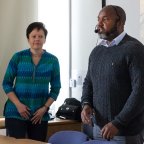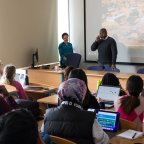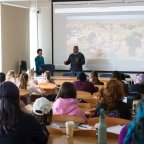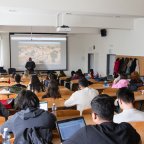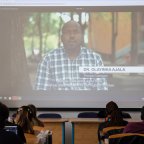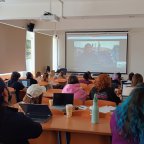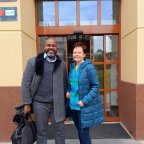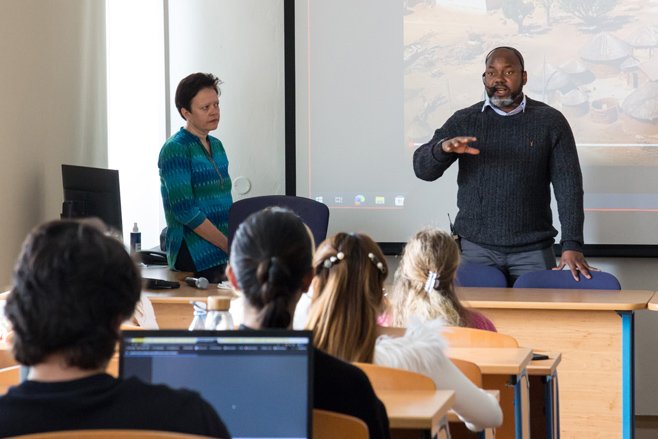
Dr. Olayinka Ajala from Leeds Beckett University (UK) visited MUP
13. 5. 2024 Author: Tereza Němečková The African Studies Centre at MUP continuously aims to connect with foreign researchers and institutions. One recent outcome was the visit of Dr. Olayinka Ajala from Leeds Beckett University in the United Kingdom. Dr. Ajala came to screen a documentary titled 'A Place Once Called Home,' one of his research outputs. This documentary highlights the lived experiences of farmers, reasons for forced migration and displacement, and resulting livelihood transformations in Nigeria. Dr. Ajala also engaged in discussions with students about the content.Agriculture, and more recently, sustainable agriculture in Nigeria, comprise an industry that employs a significant portion of the country’s population. Over 60 percent of Nigerians are involved in the agricultural sector, either directly or indirectly, although predominantly at a subsistence level. Recent anecdotal reports indicate that the effects of climate change, along with the rise in banditry, terrorism, and conflicts between farmers and pastoralists, have compounded the challenges to agricultural sustainability in the country.
Research conducted by the Institute for Peace and Conflict Resolution reveals that over the past five years, conflicts between farmers and pastoralists have led to the displacement of over 300,000 people, primarily from farming communities, in four Nigerian states: Benue, Plateau, Nasarawa, and Taraba. Furthermore, as of February 2023, approximately 2.4 million internally displaced persons were recorded in Nigeria as a whole. Thousands of these displaced communities have resettled in various parts of the country.
Dr. Olayinka Ajala visited MUP to screen a documentary titled 'A Place Once Called Home,' which reflects the results of his project. The aim of his investigation was to assess the extent to which factors such as climate change, terrorism, and conflicts between farmers and pastoralists have contributed to forced displacements, as well as to understand how farming communities are adapting their livelihoods in response. The documentary sparked a lively discussion among students, covering many relevant aspects of the current situation facing displaced communities in Nigeria.
We extend our sincere thanks to Dr. Ajala for his willingness to visit Prague and eagerly anticipate further opportunities for collaboration.
The African Studies Centre at MUP
Další z rubriky
 Na Metropolitní univerzitě Praha proběhla on-site visit Mezinárodního evaluačního panelu
23. 6. 2025 Autor: Ing. Tomáš Nikodym, Ph.D.
V rámci kompletního hodnocení výzkumných organizací v segmentu vysokých škol dle Metodiky 2025+ proběhla na Metropolitní univerzitě Praha tzv. on-site visit Mezinárodního evaluačního panelu.
Na Metropolitní univerzitě Praha proběhla on-site visit Mezinárodního evaluačního panelu
23. 6. 2025 Autor: Ing. Tomáš Nikodym, Ph.D.
V rámci kompletního hodnocení výzkumných organizací v segmentu vysokých škol dle Metodiky 2025+ proběhla na Metropolitní univerzitě Praha tzv. on-site visit Mezinárodního evaluačního panelu.
 Memorandum o spolupráci Metropolitní univerzity Praha a Českého červeného kříže
18. 6. 2025 Autor: redakce
Metropolitní univerzita Praha (MUP) a Český červený kříž (ČČK) dnes slavnostně uzavřeli memorandum o spolupráci, které stvrzuje společný závazek obou institucí přispívat ke společensky prospěšným aktivitám, rozvoji dobrovolnictví a vzdělávání v oblasti humanitárních a sociálních činností.
Memorandum o spolupráci Metropolitní univerzity Praha a Českého červeného kříže
18. 6. 2025 Autor: redakce
Metropolitní univerzita Praha (MUP) a Český červený kříž (ČČK) dnes slavnostně uzavřeli memorandum o spolupráci, které stvrzuje společný závazek obou institucí přispívat ke společensky prospěšným aktivitám, rozvoji dobrovolnictví a vzdělávání v oblasti humanitárních a sociálních činností.
 Populism, Foreign Policy, and a Week of Intense Debate: PhD Summer School at MUP
9. 6. 2025 Autor: Šárka Kolmašová
From June 2 to 6, the Center for Security Studies (C4SS) at Metropolitan University Prague hosted a week-long Doctoral Summer School under the Erasmus+ Blended Intensive Programme (BIP), taking on one of today’s most urgent political questions: How is populism reshaping foreign and security policy in Central and Eastern Europe? The event gathered PhD students from Poland, Slovakia, Lithuania, Portugal, and Bulgaria, each bringing fresh insights and case studies from their own regions. Across five packed days—and two preparatory online sessions—participants dissected narratives, analyzed media, pitched research, and explored publishing strategies with a lineup of top-tier scholars.
Populism, Foreign Policy, and a Week of Intense Debate: PhD Summer School at MUP
9. 6. 2025 Autor: Šárka Kolmašová
From June 2 to 6, the Center for Security Studies (C4SS) at Metropolitan University Prague hosted a week-long Doctoral Summer School under the Erasmus+ Blended Intensive Programme (BIP), taking on one of today’s most urgent political questions: How is populism reshaping foreign and security policy in Central and Eastern Europe? The event gathered PhD students from Poland, Slovakia, Lithuania, Portugal, and Bulgaria, each bringing fresh insights and case studies from their own regions. Across five packed days—and two preparatory online sessions—participants dissected narratives, analyzed media, pitched research, and explored publishing strategies with a lineup of top-tier scholars.
